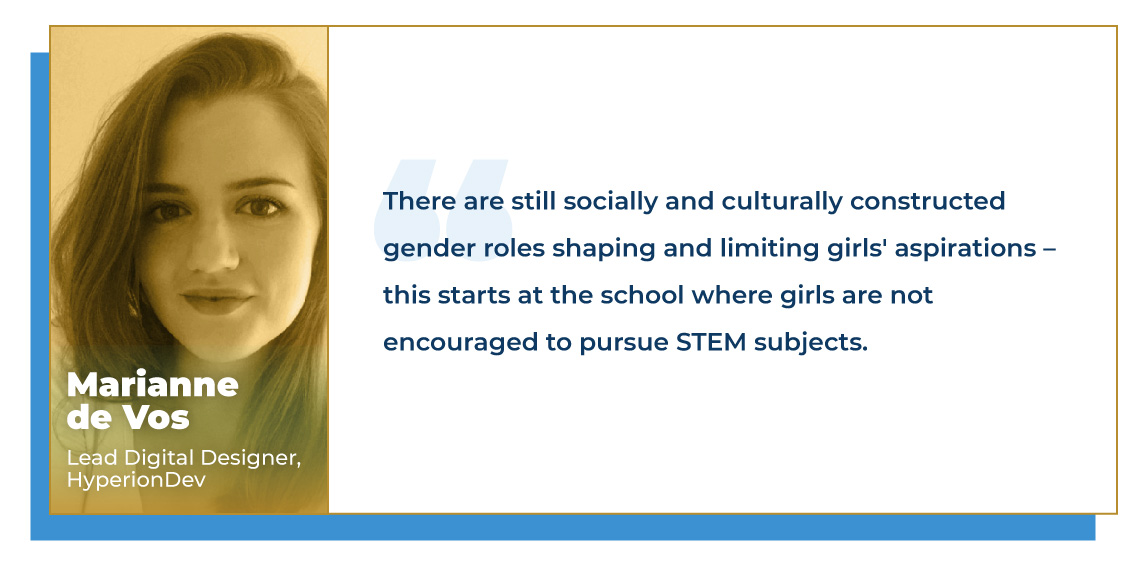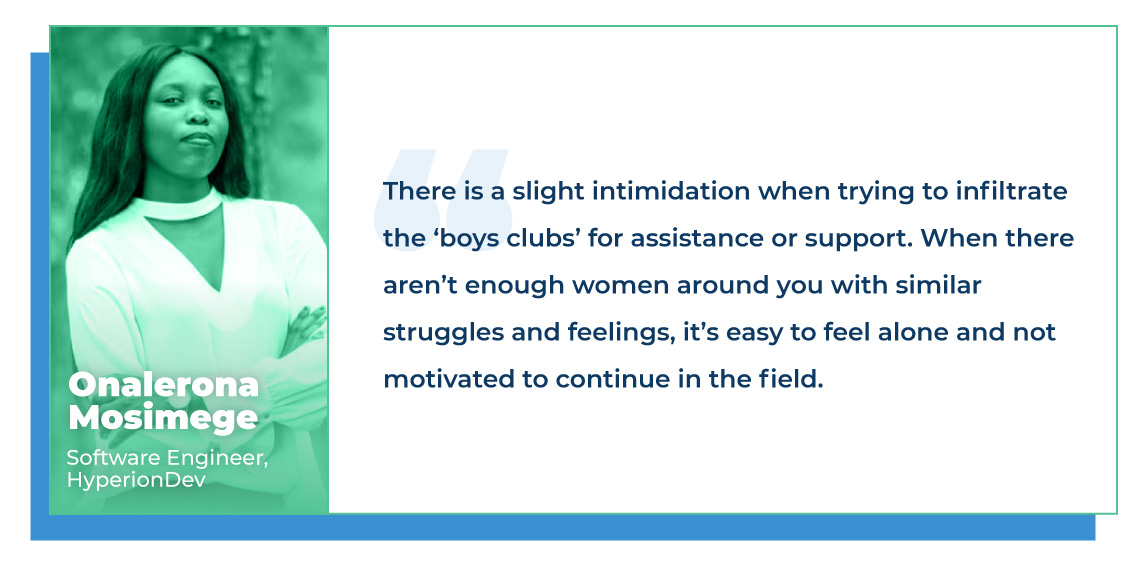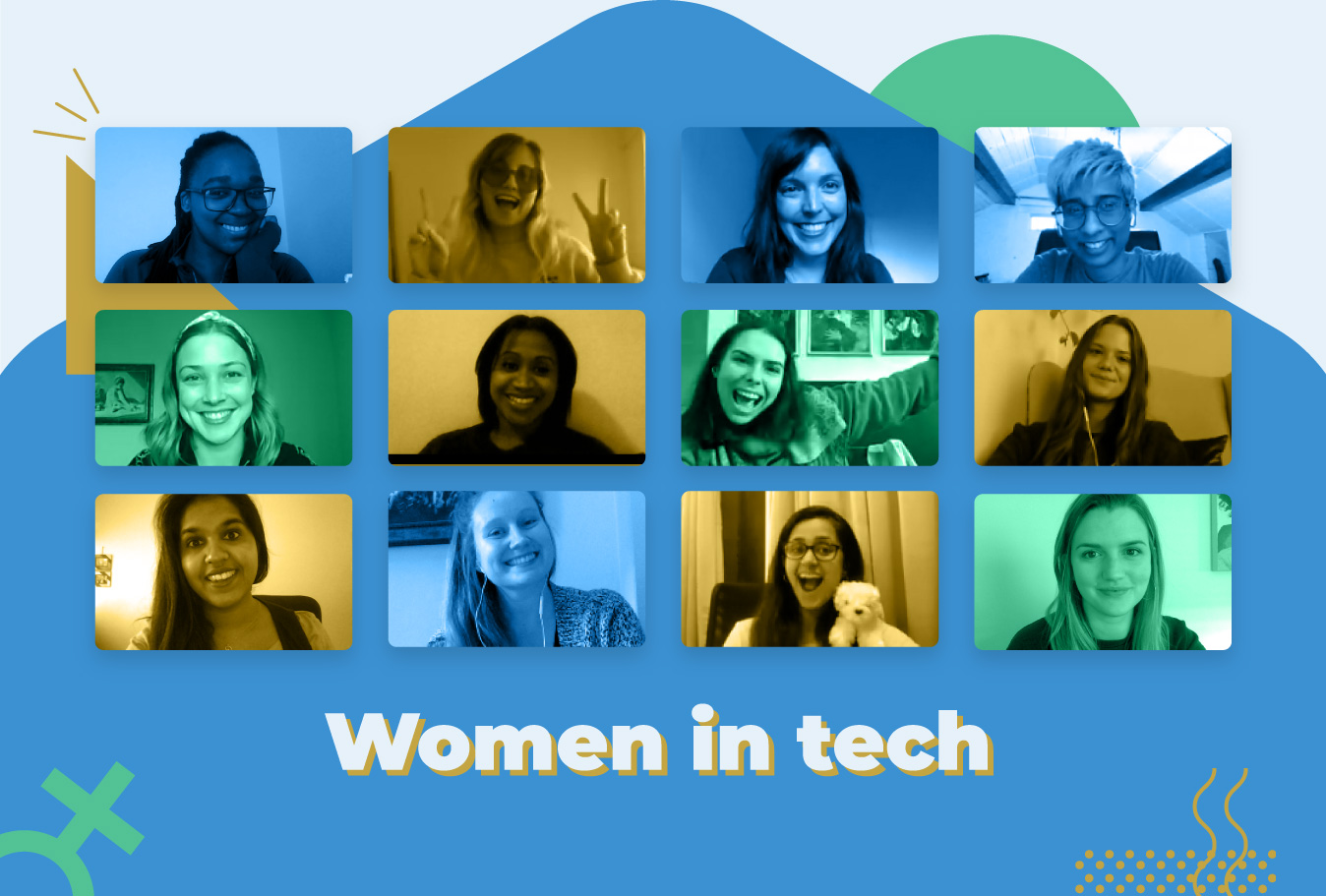Onalerona, one of our HyperionDev Software Engineers, was 14 years old when she knew she wanted to be a programmer. “My high school did a ‘test’ IT class”, she shares. “During that class, we had to code in Pascal and Delphi to create a program that had a button, and the button would turn the screen green when clicked. The program, in its entirety, was probably 6 lines of code. But the feeling I got when that screen changed colour – I’ve been hooked on the idea of being a programmer ever since.”
But why are there so few stories like Onalerona’s? We spoke to Onalerona as well as HyperionDev’s UX/UI designer, Marianne, about their experiences of being women in a tech field, as well as what they hope to see in the future, to get a better understanding of the issues that women in tech face.
Women in Tech: the stats
Despite the years of progress made towards gender parity, especially in the workplace, women still remain critically underrepresented in most STEM fields – across tertiary education institutions and the workforce.
A recent PwC #WomeninTech report found that at the top 10 global tech companies, only 19% of tech-related roles were held by women. What’s more, women made up a mere 28% of their senior leadership, relative to the 72% male leadership.
In South Africa specifically, the number of males graduating with STEM-related degrees far outweighs the number of women graduating with these degrees, especially when it comes to ICT and tech.
- Men outnumber women in maths and statistics degrees 4:5.
- Men outnumber women in ICT and technology degrees 2:5.
- Men outnumber women in engineering, manufacturing and construction degrees 3:10.
It’s clear that drastic change is needed on multiple levels. The PwC #WomeninTech report asserts that in order to alter the way in which we develop and deploy female tech talent, we need an ‘undoing and relearning of age-old thought processes and the formation of new norms and values – especially in the education system and labour market. Biases are ingrained in our cognitive processes and undoing them is difficult’.
The report outlines a number of the barriers that contribute to this issue:
- A lack of female representation in the workplace.
- A lack of representation in senior leadership roles.
- Gender-biased classrooms and educational settings.
- Gender-biased behavioural design from an early age.

What it’s like for women in tech
Onalerona had always wanted to get into programming as a career. “Initially, it was the love for programming, but it has since evolved,” she told us. “While I was studying at the University of Cape Town, I started doing a lot of tech-related community work. I volunteered for Code4CT, which was a non profit organisation that taught high school girls how to code. I was also Chair for Women in Computer Science UCT.”
“I grew a passion for advocating for women in tech, and I feel my purpose to still be here is to expose as many tech opportunities to women, retention of women in tech, and aid where I can to make their tech journey a little bit better.”
Marianne, on the other hand, had spent years as a multidisciplinary designer, but had always felt drawn to the tech industry.
“Ironically I probably related more to the tech industry than the creative industry. I didn’t identify with the stereotype of an eccentric ‘creative’,” she shares.

“Having worked in multiple design disciplines, I can see in retrospect that as soon as I designed my first unique web interface, it was all I wanted to do. I loved exploring the functionality needed and where the user interactions would work logically and creatively,” Marianne shares. “I grew more and more interested in satisfying user needs: creating functional products to be used daily, impacting user’s lives. That desire drove my career path to the tech industry pretty naturally.”
Many barriers still stand for women in tech
However, from both Onalerona’s and Marianne’s experiences it’s clear that there are many obstacles to surmount.
Marianne shares that, “It becomes apparent in more informal social settings that there are still fundamentally prejudiced nuances embedded in conversations around women in tech. The underrepresentation of women in tech then equates to a lack of female role models to inspire girls at an age where parental control, peer pressure and self-esteem can heavily influence their career decisions.”
For Onalerona, overcoming these hurdles was a matter of her passion for the industry and the work she does – although putting on a brave face and keeping at it isn’t always so easy.
“Representation matters a lot and makes a big difference. In my first year of studying, we had a huge and quite diverse computer science class. By my last exam in my third year, there were only 4 girls in the examination room. A lot of my female friends left computer science mostly because they felt as if they were struggling alone.”

Fast forward to working in the industry, Onalerona is now committed to championing diversity and inclusion in the tech space in order to ensure that these issues are curbed and more women can be retained in the industry.
What can be done to improve the situation
While the issues women face in joining the tech industry might be numerous and powerful, they’re not impossible to overcome. There are a number of strategies that schools, businesses, and parents can take to support girls and women as they pursue their passion and interest in technology.
- Improve female representation in companies.
- Implement double-blind strategies to combat biases in hiring
- Create and support education initiatives, like scholarships, that support young women in tech
- Create an industry that listens to and addresses the problems women have in the tech sector
Our coding bootcamps and hiring strategies are designed to build people up into experienced and high-achieving tech professionals, no matter their background. Our online and on-site coding bootcamps teach job-ready tech skills to the people who need them, with no requirement for a high school diploma or any coding experience; and our team of expert A-players is always looking for passionate, dedicated, and hard-working women (and men!) to scale our bootcamps to be the best in the world.
Find your start into a rewarding and fulfilling tech career by clicking here, or find out how you can join our diverse, international team by clicking here.


